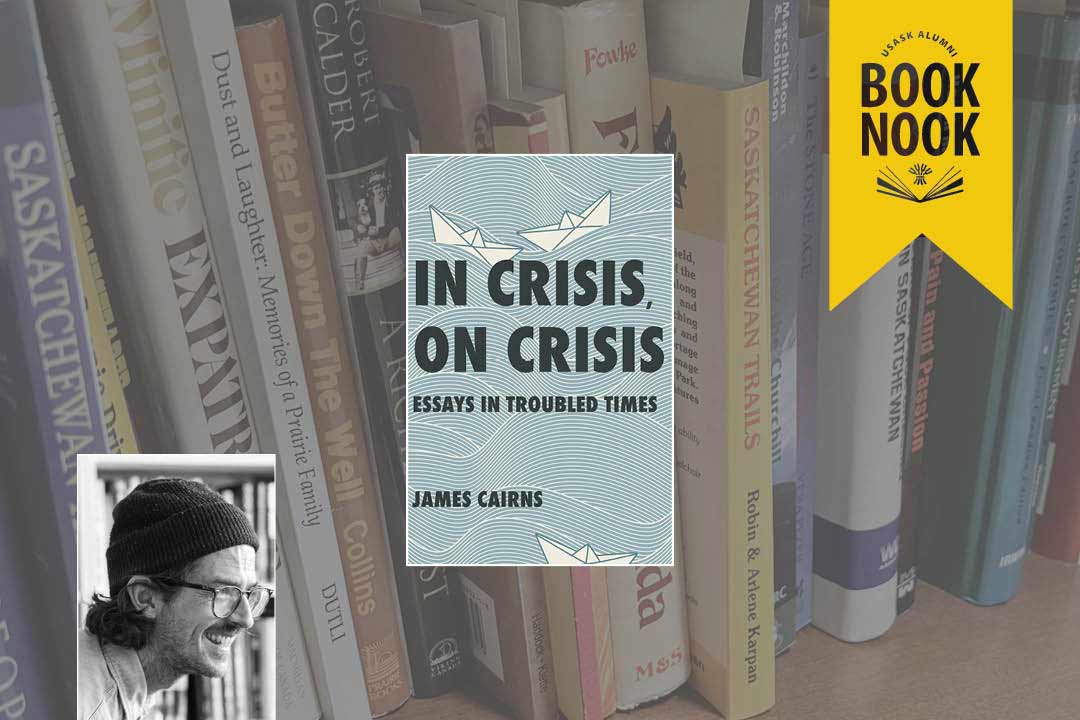
Alumni Book Nook: Dr. James Cairns (MA’03, PhD)
In Crisis, On Crisis: Essays in Troubled Times is the latest book by USask political studies graduate Dr. James Cairns, who lives and works in Ontario
University of Saskatchewan (USask) graduate Dr. James Cairns (MA’03, PhD) is exploring the current state of the world in his new book In Crisis, On Crisis: Essays in Troubled Times.
Cairns’ collection of essays, released by publisher Wolsak & Wynn on June 10, 2025, examines political divisiveness, global instability, and ecological crises. Cairns, an associate professor in the Department of Indigenous Studies, Law and Social Justice at Wilfrid Laurier University, said he was inspired to write the book because of “the growing sense in public discussion that we are living through an unprecedentedly dangerous turning point.” The book also aligns with his interests as a scholar, author, teacher, and researcher.
“My teaching and research focus on the big questions of how we organize ourselves in society,” he said. “How did today’s inequalities come to be ‘normal,’ and why do so many people go along with the status quo so much of the time? Who actively resists—why, when, and how? What would it look like to live in a truly democratic, socially just, and ecologically sustainable society? How do we get from here to there?”
After completing a Bachelor of Arts degree at the University of Toronto, Cairns came to USask to pursue graduate studies, earning his Master of Arts (MA) degree in political studies in 2003. He then went on to complete a PhD in Communication and Culture from the interdisciplinary joint program at Toronto Metropolitan University and York University in 2008, before joining the faculty at Wilfrid Laurier University in 2009.
Cairns is currently based in Paris, Ont., where he is also a staff writer at the Hamilton Review of Books. His previous books include 2017’s The Myth of the Age of Entitlement: Millennials, Austerity, and Hope, as well as two books co-authored with Alan Sears: A Good Book, In Theory: Making Sense Through Inquiry and The Democratic Imagination: Envisioning Popular Power in the 21st Century.
The Green&White recently asked Cairns about his newest book, In Crisis, On Crisis: Essays in Troubled Times.
What is the focus of your new book?
In 2022, the Collins Dictionary announced that its word of the year was “permacrisis,” which it defined as “an extended period of instability and insecurity, especially one resulting from a series of catastrophic events.” Have we reached a breaking point, and arrived at the moment of truth? If so, what now? If not, why do so many people say we’re living through a period of unprecedented crises?
Drawing on social research, pop culture, and literature, as well as on my own experiences as an activist, father, and teacher, I explore the ecological crisis, Trump’s return to power amid the so-called crisis of democracy, my own struggle with addiction, and other moments of truth facing us today. In a series of essays that move between personal, theoretical, and historical, I consider not only what makes something a crisis, but also how to navigate the effects of these destabilizing times on ourselves, on our families, and on the world.
Did your education at USask play a role in researching and/or writing this book?
I learned to write long-form social science prose from my brilliant and kind MA supervisor, David Smith (USask political studies department).
Why would you recommend your book to USask alumni?
The book asks questions that I think many people are asking themselves, especially since Trump has moved back into the White House. In my case: What do I say to my two young children, to my political allies, to my students—to myself—about how to live through such turmoil, about how the crises of our times end? Are the crises of our time more plentiful, more dangerous, than crises of the past? Have we truly reached a breaking point? How do we orient to the future? What do I do with the sense of powerlessness and fear I share with so many others?
What are five adjectives that you would use to describe your book?
Urgent, insightful, engaging, personal, and provocative.


